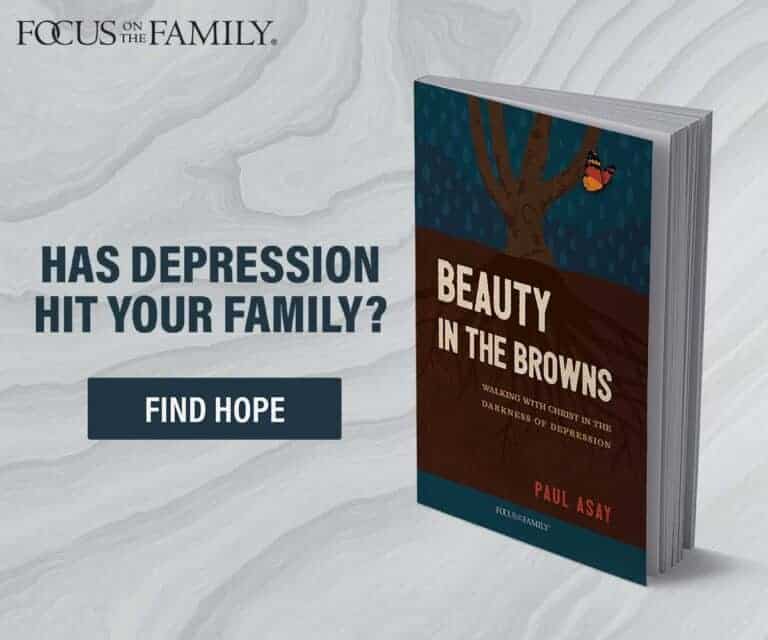Estimated reading time: 7 minutes
Depression is a monster that runs rampant in our streets. It invades people’s homes and robs them of their sleep, energy, and appetites. But what it’s really after is your joy and will to live. What weapon can you wield against depression, to protect your marriage from this dark beast?
When it tries to steal your joy, hang onto it. When it tries to pry your will to live from your hands, don’t let go. Perseverance is your greatest weapon against depression. Learn how to wield it.
Table of contents
The Nihilistic Nature of Fighting Depression
Did you ever have a boxing clown? At some point in my boyhood, I got one for a birthday present. This inflatable toy had a round bottom and was painted to look like a clown. The idea was to hit it as often as you wanted. Maybe it was supposed to help you learn to box; if so, I was a miserable failure.
In any case, this opponent was a pushover — literally. It never tried to fight back, never defended itself, and never got mad at me. Always smiling and standing still, it presented a beautiful target I could pummel to my heart’s content. But a funny thing happened with the boxing clown.
I lost every fight I had with it.
But I was the one doing the punching and the knocking down. I was the one who should have won! But the clown had a secret. Because of its round bottom, it never stayed knocked over. No matter how many times I punched the clown’s lights out, it always came back upright.
By the end of the fight, I was exhausted. Punched out and worn out, I was ready to quit. But my opponent, the clown, still stood there, smiling that infuriating grin at me. When I left the room, I sometimes imagined it raising its arms in victory behind my back — smiling all the while, of course.
So What Is the Best Weapon Against Depression?
Perseverance.
After faith, it’s the strongest weapon we have with which to fight depression. It helps us break a deadly cycle of which we may not even be aware. And breaking that cycle produces some positive side effects: new, powerful habits that actually act as our allies.
How does the weapon of perseverance accomplish all this? First, let’s take a look at this deadly cycle.
Stage One of the Depressive Cycle
When we notice depression’s arrival, what is our reaction? In my counseling and discussions with depressed people, I’ve discovered we initially react in one of two ways.
- Surprise. We never expect the depression to return again and can’t see it coming until it has completely surrounded us.
- Familiarity. We know our depression is pretty regular; we understand its signs and can watch as it approaches and settles in.
That is the first stage of the cycle of depression. But whether we are surprised by its appearance or we see it coming, we often react in the same way to the cycle’s second stage, and this is the part that is most important — and deadly.
Stage Two of the Depressive Cycle
Let me talk directly to you for a moment. After realizing you are experiencing a depressive episode, how do you react?
If you are like many I’ve counseled, you give up. You throw up your hands and say, “Depression is here again. There’s nothing I can do about it.”
And then you let the disease dictate how you will react emotionally. And your spouse can do nothing to help you.
Black moods and periods of doubt control you until the depression leaves and the cycle, for the moment, is complete. Then you wait, without realizing it, for the next cycle to begin.
But what if you changed the cycle?
Believe it or not, it is within your power to do so. Again, you may not be able to stop depression from descending on you or your spouse, but you can choose how you will respond to it.
Choose to Respond to Depression by Raising Your Weapon
Here’s where the weapon of perseverance delivers a mortal blow to your enemy. You simply tell depression: “I’m never giving up or giving in to you. You may continue to plague me, but I’ll fight you with everything I’ve got. My emotions don’t belong to you, and I refuse to let them be held hostage without a fight. You may knock me down, but I’ve decided to keep on getting up. And I’ll fight you. Every. Time.”
What does this type of attitude accomplish?
- It breaks your usual cycle. You no longer simply give up when depression hits you.
- It begins to give you more control over your emotions and helps you no longer feel like a victim.
- You build confidence in yourself. In many cases this shortens the amount of time depression stays with you.
- Using the weapon of perseverance on a regular basis builds powerful habits in your behavior. Use it long enough and eventually you begin fighting depression when it appears without even realizing it!
Let me give you a word of encouragement. Even a little effort on your part each time is helpful.
Even if you can’t successfully fight off depression this time, but begin trying to do so, you have made progress. Making the decision to do what you can each time will make you stronger. Perseverance pays off, so use it intentionally as your weapon against depression.
Persevere to the End of the Race
Flash back to 1968. The Mexico City Olympics are taking place amid great fanfare. As the marathon contestants line up, spectators buzz about possible winners of the race that gave birth to the entire Olympic movement. Most of the attention focuses on Mamo Wolde of Ethiopia, and rightly so; he will win the marathon. But he will not be the only winner that day.
With the crack of the starter’s gun, the contestants begin their quest for a gold medal.
One of the runners, John Stephen Akhwari of Tanzania, finds himself trapped in the middle of some other runners several miles into the race. Unable to see well, he falls and hurts his leg horribly. He watches in anguish as the other racers continue. John Stephen Akhwari will not win the marathon on this day. He has come to Mexico City and failed.
Or has he?
Now flash forward to the end of the race. Wolde, the Ethiopian, has already won. An hour has passed, darkness is falling, and the last spectators are leaving the stadium.
Suddenly their attention is drawn to the sounds of police sirens. The marathon gate to the stadium is thrown open, and, unbelievably, a lone runner stumbles into the stadium for his last lap.
It is John Stephen Akhwari. Hobbling painfully on his bandaged leg, grimacing with every step, knowing he cannot win the race, he continues all the same. Finally he crosses the finish line and collapses.
Why, someone asked him, didn’t he stop after injuring himself? After all, there was no way he could win the race. Listen to John Stephen Akhwari’s response: “My country did not send me to Mexico City to start the race,” he said with dignity. “They sent me to finish the race.”
Know What You Stand Up For
Let’s flash back two thousand years to another man who knew how to persevere. The apostle Paul was a man who devoted himself wholly, unselfishly, to God. But it certainly did not ensure him a life of pleasure and ease.
You could say his life was maxed out with beatings, persecutions, and, to add insult to injury, multiple imprisonments. These prisons, I might add, had no weight rooms, color television, or time off for good behavior. In addition, some of Paul’s peers criticized the apostle for getting himself into what they believed were embarrassing circumstances.
Paul, put in prison once more, could have given up.
Instead, he had this to say: “I am not ashamed, because I know whom I have believed, and am convinced that he is able to guard what I have entrusted to him for that day” (2 Timothy 1:12).
Paul knew God would not fail him. He believed that the Christian who stayed faithful, even in the tough times, would be ultimately blessed for his perseverance. He knew what weapon to use against despair and depression.
Does God Care if I’m Depressed?
God has a special place in his heart for those who endure.
Human power doesn’t interest him. Dynamic personalities and great people skills don’t impress Him. He sees through smiles and designer clothes, looking for something more. “The eyes of the LORD are on those who fear Him, on those whose hope is in His unfailing love” (Psalm 33:18).
If you’re giving the best of yourself to God and trusting in Christ to save you, then the heavenly Father’s eyes are on you. He blesses you every time you get knocked down by depression and then get up, still trusting God and still willing to live for Him.
Looked at in this way, depression does not make you a failure. Instead, it makes you a strong Christian and a winner in God’s eyes.
Even if depression keeps knocking you down, make the decision today to keep getting up. Let Paul’s creed also be yours: “Therefore put on the full armor of God, so that when the day of evil comes, you may be able to stand your ground, and after you have done everything, to stand” (Ephesians 6:13).
Keep on standing.




















